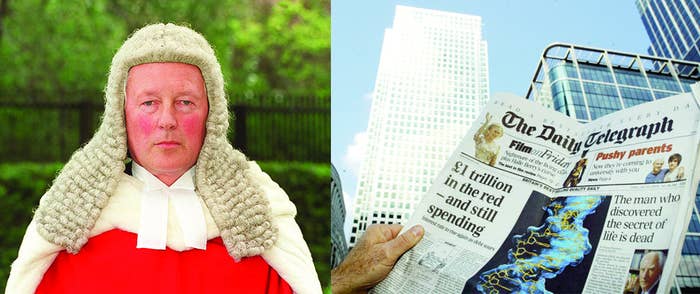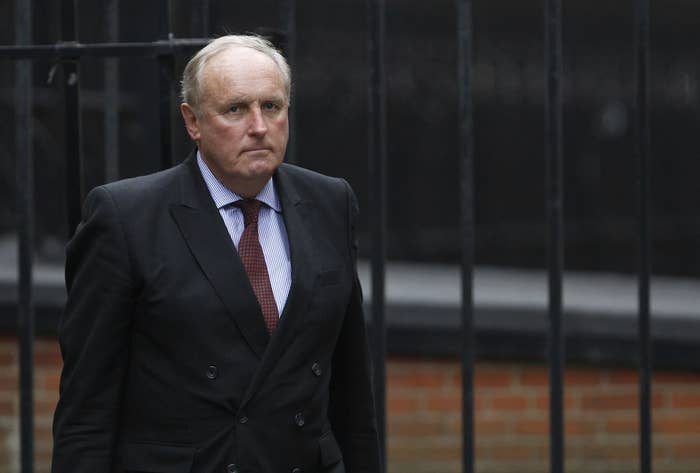
In 16 years on the High Court bench, Sir David Eady became known as one of Fleet Street’s fiercest adversaries – a judicial lone wolf whose rulings, the press believed, made it harder to hold the rich and powerful to account.
He was, the Daily Telegraph once said in the headline of an editorial, "the judge who stops us from knowing the truth”.
But BuzzFeed News can reveal that, despite this perceived animosity, Eady was hired by executives at Telegraph Media Group last year to discreetly review the handling of a contentious story that cost the publisher hundreds of thousands of pounds in an out-of-court settlement.
Eady was brought in to secretly examine procedures for vetting stories after it was accused of libelling a London businessman, according to four people with knowledge of the matter.
Few people in the newsroom knew about the former judge’s role, and those who did were surprised and alarmed.
“The journalists who know about it are absolutely outraged,” one person with knowledge of the inquiry told BuzzFeed News.
Before retiring in 2013, Eady ruled against newspapers, including the Telegraph titles, in a succession of prominent cases. Editors on Fleet Street accused him of putting the rights of entertainers, sports stars, and businessmen to keep their indiscretions private ahead of the rights of newspapers to report freely, in the process single-handedly imposing a privacy law.
Eady was brought in after the Telegraph was sued by Mujibul Islam, a property developer, for wrongly suggesting he had bought the Poplar Town Hall in east London for a knockdown price in a corrupt arrangement with the mayor of Tower Hamlets, Lutfur Rahman. The claim was made in a series of articles about Rahman by Andrew Gilligan, one of the paper's best-known and most experienced investigative reporters.
The publisher settled the case out of court. In May last year, the Sunday Telegraph published an apology in which it said any suggestion Islam had been the willing beneficiary of corruption was untrue. “We accept that Mr Islam bid for the property on the open market and did not manipulate the planning process,” the newspaper said.
The newspaper said it paid damages and legal costs, which were not disclosed. According to a person familiar with the arrangement, the publisher paid out more than £420,000, most of which was legal costs. The figure does not include the cost of the Telegraph’s own lawyers.
Eady was brought in by Telegraph management while the case was still open, which surprised some of those involved, according to two sources with knowledge of the matter.
Only a handful of people knew about his involvement. "None of this reached the shop floor," said one journalist.
Even those who were aware weren't clear on all the details. The retired judge focused mostly on the legal department but also interviewed some senior members of the editorial staff, one of the sources said. Eady recommended improvements to the Telegraph's procedures for overseeing the publication of articles, but did not assign blame to any individual, the source added.
Soon after, the Telegraph group's senior lawyer, Adam Cannon, abruptly left the company. Staff in the newsroom were not given an explanation for his departure and it remains a mystery why he left, said two journalists who were not aware of the Eady inquiry.
Paul Vickers, a former lawyer at Trinity Mirror, was hired to replace Cannon. Cannon has since joined The Sun. He declined to comment.
Gilligan also left the Telegraph, in a round of job losses last May that resulted in several senior journalists and editors leaving the company. Gilligan, now at the Sunday Times, did not respond to a request for comment.
Eady’s secret review was known only to a small group of executives, lawyers, and senior editorial staff, the sources said. The journalists who were aware of Eady's involvement were angry that the judge who had ruled so often and so robustly against the press – including against the Telegraph titles – had been called in, according to one person with knowledge of the situation.
"Those who know are really upset," the person added.
As those employees saw it, Eady had spent his years on the bench making their jobs harder.
One of his most famous judgments was in a case brought by Max Mosley against the News of the World in 2008. In that decision, Eady found that the News of the World’s article about Mosley’s involvement in a sadomasochistic orgy was a breach of privacy and ordered the newspaper to pay £60,000 in damages. There was no public interest in publication even if some readers would’ve found Mosley’s behaviour distasteful, Eady said.
The judgment was jeered on Fleet Street, particularly at the Daily Mail, which accused Eady in a leading article of allowing rich and powerful people with something to hide to “sleep more soundly in their beds”.
A few months later, Paul Dacre, the Mail’s influential editor, gave a rare speech at a newspaper conference in which he accused Eady of making “arrogant and amoral judgments” that imposed privacy law by stealth.

The Daily Telegraph’s editorial writers also accused Eady of hampering journalism with his decision in the Mosley case. “Mr Justice Eady’s judgment will make it more difficult to expose those in positions of power who do wrong,” the newspaper said in an editorial headlined "Judge has hampered freedom of expression".
Two years later, in an editorial about another case, the Telegraph said Eady had “gained a certain notoriety for handing down judgments inimical to freedom of speech”.
In 2011, another editorial was harshly critical of Eady’s decision to prevent newspapers revealing the identity of a well-known actor who had allegedly paid for sex. The “spectacularly all-embracing” order was “another dangerous inroad into one of the cornerstones of our liberties, the right to free speech,” the newspaper said.
The need to balance the rights of the rich, powerful, and famous to protect their privacy had to be balanced against that of the public to speak freely, the newspaper added, yet that requirement “seems to pass Mr Justice Eady by”.
The Telegraph group declined to comment on why Eady was hired or the details of his audit. In an emailed statement, a spokesman for the publisher said: “We keep all our legal procedures under review but we would never comment on the details of any of them.”
Eady declined to comment. “It’s confidential,” he said.
Carter-Ruck, Mujibul Islam’s solicitors, would not comment on the terms of the settlement.
